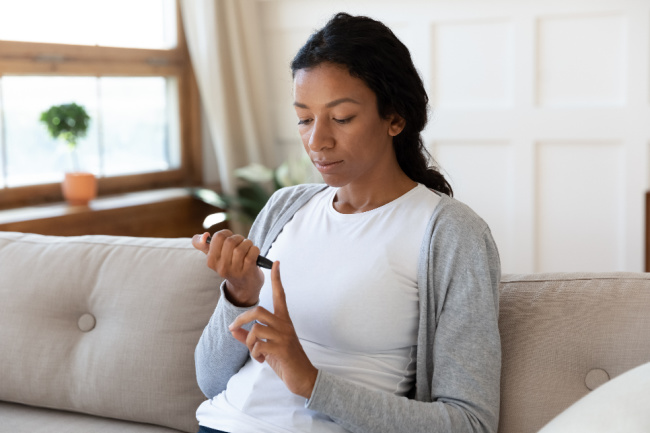
How can diabetes affect a woman’s sex life?

Women with diabetes may experience sexual difficulties. If not properly controlled, high blood sugar can damage nerves and blood vessels, including those needed for good sexual function. It can also inhibit blood flow to the genitals, which is needed for heightened sensation and lubrication.
Here are some of the more common issues women with diabetes might face:
- Low desire and arousal. A woman’s brain is an important part of her sexuality. When she is sexually stimulated, her brain sends messages to her genitals to start getting ready for sex.
But sometimes, nerve damage from diabetes can interfere with the way these signals are transmitted. Consequently, a woman might lose interest in sex. Or her body may not prepare for sex sufficiently.
- Less physical sensation. Some women feel less sensation in their genitals due to nerve damage and poorer blood flow to the area. Sensual touch may not feel as pleasurable. Women may have difficulties becoming aroused or reaching orgasm.
- Vaginal dryness. Typically, the vagina becomes wet when a woman is sexually aroused. However, high blood sugar can interfere with lubrication, leaving the vagina dry and tight. As a result, intercourse can become quite uncomfortable.
Some women find that an over-the-counter lubricant relieves dryness. Estrogen therapy is another option for postmenopausal women.
- Yeast infections and urinary tract infections. Bacteria flourish when blood sugar levels are high, so diabetic women become more prone to these infections, which irritate vaginal tissue. Postmenopausal women might be at higher risk for yeast infections because of estrogen declines and changes in vaginal tissue.
- Orgasm difficulties. Proper nerve signaling and genital blood flow are both necessary for sensation and orgasm.
- Depression and anxiety. Diabetes can be stressful. Managing medications, following diets, and testing blood sugar can take their toll after a while. With stress at the forefront of her mind, a woman may have trouble relaxing and enjoying intimacy. She might also become less interested in sex overall.
- Other complications. Diabetes is associated with other health conditions that can affect sexual function, such as heart disease and peripheral neuropathy.
In spite of these issues, there are several things women can do to reduce the impact of diabetes on their sexual function.
- See your doctor regularly. While diabetes can affect a woman’s sex life, other factors can, too. For example, menopause, medications, and relationship problems can all contribute to sexual problems. A complete physical may reveal other conditions that need attention.
You’ll want to have regular checkups to monitor your diabetes. It’s also possible for medications, such as blood pressure drugs or antidepressants, to have sexual side effects, so your doctor might suggest some adjustments.
- Keep your blood sugar under control. Follow your doctor’s instructions for good diabetes management. This can mean checking your glucose levels consistently, taking your medications and insulin exactly as directed, getting the recommended amount of exercise, and following dietary guidelines.
You may feel that your food choices are limited, but this is a good time to be creative with meal planning. Search for diabetic recipes online and learn about substitutions you can make to keep your meals interesting. Try to make it fun. Have a “cooking night” with your partner or a friend.
- Consider seeing a counselor or sex therapist. Sometimes, the stress of managing diabetes is overwhelming. A therapist can help a woman (and her partner) work through that stress and related anxiety.
Resources
- Diabetes Care - “Sexual Dysfunction in Women With Type 1 Diabetes: A Controlled Study”
Enzlin, Paul, MA, et al.
(Abstract. April 2002)
https://care.diabetesjournals.org/content/25/4/672
- Diabetes UK (British Diabetic Association) - “Diabetes and Sexual Problems – In Women”
https://www.diabetes.org.uk/guide-to-diabetes/complications/sexual-problems-women
- EverydayHealth.com - “Sex With Diabetes: Women’s Awkward Bedroom Questions, Answered”
Ruder, Kate
(Last updated: August 24, 2017)
https://www.everydayhealth.com/type-2-diabetes/living-with/sex-with-diabetes-womens-awkward-bedroom-questions-answered/
- SexHealthMatters.org - “Diabetes and Female Sexual Satisfaction”
(August 23, 2012)
https://www.sexhealthmatters.org/sex-health-blog/diabetes-and-female-sexual-satisfaction-sex-health-blog
- “Sexual Function in Pregnant Women with Gestational Diabetes”
(May 1, 2013)
https://www.sexhealthmatters.org/news/sexual-function-in-pregnant-women-with-gestational-diabetes
- WebMD - “Women, Sex, and Diabetes”
Leifer, Michelle
(Reviewed: April 30, 2017)
https://www.webmd.com/diabetes/features/women-sex-and-diabetes



